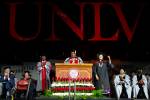Gaming consultant helps UNLV realign in Asia
Gaming industry consultant Jonathan Galaviz has long believed Nevada's economic future is connected with the booming Asian population markets.
He put that theory to test while spending six months as the interim dean at the University of Nevada, Las Vegas' campus in Singapore last year.
Galaviz, 35, was asked by Don Snyder, dean of UNLV's William F. Harrah College of Hotel Administration, to step away from his private-sector company last spring to help straighten out the campus's financial and operational issues.
The school grew faster than expected after opening in 2005 with 50 students. Now, it has more than 500 students, due partly to Singapore's booming tourism market, which saw visitation increase 20 percent in 2010. UNLV Singapore has a staff of almost 30 faculty and administrators.
Galaviz, who is the managing director and chief economist at Galaviz & Co., brought in some private-sector experience. He wrote a business plan for the campus that provided both financial and strategic direction.
Galaviz created new policies and procedures, and implemented internal oversight and a new accounting system, which gave greater transparency of revenues and cost structure. He said he viewed the interim post as a "community service" effort.
"I believe the basic foundation is there now, both financially and strategically," Galaviz said. "There is still a lot more to do but it's on the right track."
The campus, housed in Singapore's National Library building, offers undergraduate and graduate degrees in hotel administration and is self-sustaining, meaning no Nevada tax dollars are used directly or indirectly to fund it.
Along with the enrollment growth came budgetary issues. The campus's operating revenue in fiscal 2010 was $5.86 million, compared with roughly $420,000 when it started. Expenses, however, grew to $6.2 million in 2010, compared with $827,000 in 2005.
Galaviz, who put his consulting business on hold from June to December, said the school provides qualified hotel administration employees to Singapore and other Asian tourism markets, but it also benefits Nevada directly. Those trained employees, he said, could work for Nevada-based hotel-casino companies in either the U.S. or Asia, marketing and catering to an Asian customer base.
"Nevada's future economic survival will hinge, in large part, on whether the senior political leadership of the state takes the opportunity to develop relationships with companies from Asia," Galaviz said. "One of the great ways Nevada can educate the CEOs in Asia about why they should locate their U.S. subsidiary offices in Las Vegas is through the outreach that the UNLV Singapore campus can do."
Snyder, who has been president of Boyd Gaming Corp., CEO of the Fremont Street Experience, and the chairman and CEO of First Interstate Bank of Nevada, thought Galaviz was a good fit to help evaluate issues at the Singapore campus.
Galaviz had previously been a visiting instructor at both the UNLV hotel school in Las Vegas and in Singapore.
"The role Jonathan played at the campus helped leave the school in a much better financial position and a more stable operation," Snyder said.
UNLV's hotel school has long catered to foreign students, who make up 25 percent of the current enrollment. Snyder said the university isn't planning more overseas campuses for the hotel school, "because the focus needs to be on Las Vegas."
Snyder said the UNLV Singapore campus came about when the island-nation legalized gaming. The move paved the way for two hotel-casinos; Resorts World Sentosa, which is owned by Malaysia-based Genting, and the Marina Bay Sands, owned by Las Vegas Sands Corp.
"The idea was to develop a workforce for the integrated resorts and the hotel industry that grew rapidly," Snyder said.
Galaviz had experience advising the Singapore government on gaming issues and his firm works for clients in many of the growing Asian gaming markets, including Macau.
He said the UNLV Singapore campus could provide a connection between Nevada and Asia. He believes the state should follow the lead of the casino industry in expanding globally. Graduates from the Singapore campus, as well as UNLV, could serve Nevada corporations that operate overseas.
"The next wave of the middle-class economy is not going to come from domestic markets," Galaviz said. "It's going to come from China and Asia all over."
After spending six months in Singapore, Galaviz returned to Las Vegas and restarted three projects that he put on hold for Las Vegas-based gaming companies that were willing to wait.
"They understood the importance of UNLV Singapore and what I was asked to do," he said.
Contact reporter Howard Stutz at hstutz@reviewjournal.com or 702-477-3871. Follow @howardstutz on Twitter.





























